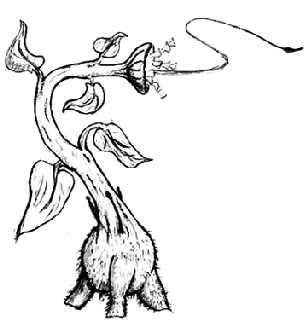 Well, "nothing interesting this week" is a lie. I'm sure plenty of interesting things have happened. It's just that I either haven't found out about them, or I have and they haven't piqued my interest or made me think.
Well, "nothing interesting this week" is a lie. I'm sure plenty of interesting things have happened. It's just that I either haven't found out about them, or I have and they haven't piqued my interest or made me think. But something happened this morning that made me think. What happened was that I was gardening. I had been assigned to deal with the dead agapanthus stalks (Something interesting! The flower stalks of agapanthus plants are called scapes), but when I had gotten most of the dead scapes I decided to tackle the huge, rambling mess of rose vines next to the second of the two gates on my driveway (that picture's not my rose plant - mine's not nearly as pretty as that).
This thing is intense. It should have a name, really (Victor and Hugo are the two names that leapt into my head at that thought. Suggestions?). It may or may not attract one's attention as one drives through the gate, but its majesty can only be appreciated on foot, examining the vines close-up. The vines (Wikipedia calls them "long, flexible canes") that make up the inner mass of the plant are brown and thicker than my fingers, while the outer exploratory vines are thin and green with deceptively small red thorns (According to Wikipedia, the name thorn refers to modified stems, and the "thorns" of a rose are actually modified epidermal tissues, which makes them "prickles"). I call these thin vines "exploratory" because they were interwoven within the agapanthus leaves, and I couldn't see them until it was too late. I even caught one burrowing underneath the grass that borders our driveway - this one I yanked out quite ruthlessly.
As I waged war on this impressive foe armed with naught but a pair of secateurs - Wikipedia says this is the British name for "pruning shears" - I always thought it was just the proper name? My mother's British, so that might explain where I got the word - anyway, as I waged my war and all that, I thought of Triffids.
For those of you who have not read John Wyndham's "The Day of the Triffids" (an excellent example of 1950s science fiction), triffids are large, carnivorous, predatory, mobile plants with a venomous stinger on a whip-like sort of tentacle-vine. Here's a triffid, as illustrated by the author (click to see it better):
The reason I was thinking of triffids was that the thin vines kept getting wrapped around my hands, shoulders, knees and zebra-print gumboots. I kept having to stop and carefully extricate myself from a net of thorns (sorry, prickles).
The thought I had about triffids in relation to rose vines was: Imagine if wild roses became mobile and predatory and sort of intelligent, like triffids! It wouldn't just seem like the rose vines were deliberately ensnaring you - they would actually be doing it on purpose! The burrowing/hidden/exploratory vines would winkle their way into our homes and workplaces, wreaking havoc with the plastering and blooming unexpectedly! They could "lay down spikes" and devastate wheeled traffic!
John Wyndham's triffids were farmed for their oil - if rose-triffids replaced the ordinary, well-behaved type of roses, rose farming would become a hazardous occupation! The added danger pay would increase the price of roses (which already shoot to exorbitant sums on Mother's and Valentine's days).
Zoos and botanical gardens would be unsure of how to classify this species, and the curators of both may just toss a coin to decide who gets to display them to the public. A new occupation would arise - rose pruners - as dismayed garden owners watch their plants tower malevolently above them. I imagine that being a rose pruner to a rose-triffid would be like being an arborist to the Whomping Willow - but with a greater risk of puncture wounds than broken bones.
In conclusion - if you find any vines from your local rose plant in unusual places, hack them off. We can't run the risk.


I say 'secateurs' too. My mum says it and she's not British. Maybe we are all just very educated?
ReplyDeleteAlso, I find it interesting how you sound different on the page from in real life. :-) Not worse or better, just different.